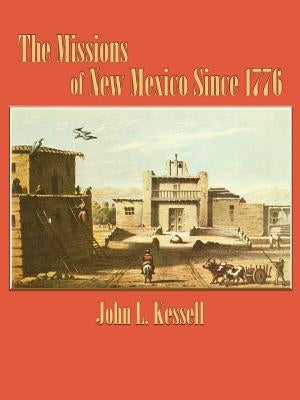Sunstone Press
The Missions of New Mexico Since 1776
The Missions of New Mexico Since 1776
Couldn't load pickup availability
The Bicentennial of the United States in 1976 gave rise to myriad projects. In New Mexico-still a borderlands possession of Spain in 1776-an unusually keen Franciscan observer, Fray Francisco Atanasio Dom nguez, painted an extraordinarily detailed and often unflattering word picture of the colony. "The Missions of New Mexico, 1776," impeccably translated and edited by distinguished historians Eleanor B. Adams and Fray Ang lico Ch vez, is a single source like no other that reveals life in raw and remote, late-eighteenth-century New Mexico. Dispatched from Mexico City as canonical inspector of the missions of New Mexico, the meticulous Father Dom nguez stepped off the measurements of the churches, counted the number of ceiling beams, and described the physical layout and contents of the missions, all to the delight of subsequent architectural and art historians. Given such detailed descriptions of the missions' fabric in 1776, a simple question arose. What has become of these mud-and-stone-built structures in the past two hundred years? Historian John L. Kessell's "The Missions of New Mexico Since 1776" addresses that question. "Two hundred years after Dom nguez," Kessell concludes, "the survival count is nothing to brag about. Of the thirty-two churches or chapels he recorded in 1776, twelve persist on more or less the same foundations in more or less the same form-San Miguel in Santa Fe, Santa Cruz de la Ca ada, Picur s, Las Trampas, Tom , Cochit , San Felipe, Santa Ana, Zia, Laguna, coma, and Isleta." And none of these has fallen since 1980. Most, in fact, are being lovingly cared for. Played out differently at each location, all of Dom nguez's churches underwent the same progression. First came neglect as Spain's American empire crumbled and Mexico tried to rule. Next Anglos peddling modernization offered tin roofs for dirt or, better still, new structures for old. By then, however, nostalgic folks had begun experiencing the charm of the outdated, and the Pueblo-Mission style of architecture was born. Simultaneously, just in time toward the end of the nineteenth century, dawned the continuing era of historic preservation. New Mexico's surviving missions had become monuments. The new editions of "Missions" and "Missions Since" from Sunstone Press make readily available these two complementary fixtures of New Mexico cultural studies. Born in New Jersey and raised in California, JOHN L. KESSELL did not set out to be a professional historian. His work in the 1960s, however, at Tumacacori National Monument, site of a Spanish colonial mission, alerted him to the possibility. Returning to graduate school with new purpose, he earned his doctorate at the University of New Mexico, survived a precarious decade as historian-for-hire, and joined the UNM Department of History. His major historical editing project with colleagues Rick Hendricks, Meredith D. Dodge, and Larry D. Miller resulted in the six-volume Journals of don Diego de Vargas, New Mexico, 1691-1704. Kessell is also author of "Kiva, Cross and Crown: The Pecos Indians and New Mexico, 1540-1840," "Pueblos, Spaniards, and the Kingdom of New Mexico," and "East Orange by Christmas," the latter also from Sunstone Press.
Author: John L. Kessell
Binding Type: Paperback
Publisher: Sunstone Press
Published: 05/15/2012
Pages: 302
Weight: 1.51lbs
Size: 11.00h x 8.25w x 0.63d
ISBN: 9780865348707


